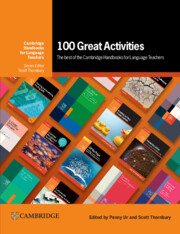4 - Writing
Published online by Cambridge University Press: 14 March 2024
Summary
Writing is a composite skill involving the ability to integrate different levels of knowledge, from the lower-level skills, such as spelling, punctuation and sentence construction, to the more comprehensive ones, such as text organization, coherence, and the way different written genres are structured. The activities in this section target these areas, either in isolation (‘Bingo’, ‘Making mine long’, ‘Creative copying’) or in combination (‘Running dictation’, ‘Dictogloss’ or ‘Delayed reverse translations’). What distinguishes these activities is that the emphasis is typically on collaboration (‘Collective story writing’), interaction (‘Foodies’, ‘Paper talk’) and/or creativity (‘Acrostic’ and ‘Once upon a time’, among many others). Hence, they provide a marked contrast to the somewhat solitary and formulaic nature of traditional classroom writing activities such as writing letters or essays.
From Writing Simple Poems: Pattern poetry for language acquisition by Vicki L. Holmes and Margaret R. Moulton
Outline Students write simple acrostic poems
Authors’ comment The acrostic can be a simple poem to write, but it can be made more challenging. Spelling is emphasized for the key word of the acrostic, but use of the dictionary can also be taught to enrich vocabulary.
Editors’ comment Writing acrostic poems is so easy and enjoyable, I don't know why teachers don't do it more! Penny uses it with students’ names, asking them to write an acrostic for their own name, and then perhaps for the name of a classmate (with the condition that it has to be nice, avoid anything that might hurt the feelings of the classmate!). Or use any other concept, like those suggested by the authors, but preferably one that the students have some kind of personal feelings about.
Level Elementary to Intermediate (A2–B1+)
Preparation None
Procedure
1 Explain what an acrostic is: that it spells out a word in a column and then explains the word in words or phrases beginning with each letter of the word. Show the students one of the samples below (choose one appropriate for the level) and ask them to identify the word (FRIEND).
- Type
- Chapter
- Information
- Publisher: Cambridge University PressPrint publication year: 2024



